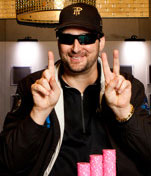-
I Regret Folding… 3-3?
I recently watched the ESPN broadcast of the 2007 World Series of Poker — my attempt to win a 12th bracelet. There were several things that I really regretted doing during the tournament.
First, why did I have to behave that way?
Seriously though, my first regret was that I spent time taking “insurance” from Phil Ivey. Ivey beat me for $109,000 in insurance bets, and I was paid $78,000 for sixth place — giving me a net loss for the tournament. This was supposed to be an opportunity to put an exclamation point on my poker resume, and separate myself (go two ahead in the all-time bracelet race) from Doyle Brunson and Johnny Chan. I should have sat there and focused on the players at the table.
My second regret was that I talked too much. Is talking a weapon? Sometimes. But when you’re talking, you’re usually missing something at the table: especially when your talk is laced with ego. When I’m too busy telling the world how great I am at poker, I waste energy and emotion. And I miss the point: I need to prove my skills that day, the next day and everyday the rest of my poker career.
My third regret was that I didn’t play more aggressively. I should have reraised — and thus won the pot — at least a few times when I knew that my opponents were weak. In fact, there were several times that my gut told me that someone was weak, especially when they raised my blinds. And remember that one successful reraise not only wins a lot of chips, but it also sends the message, “Don’t mess with my blinds!”
Another regret I have was folding my pocket threes. Let me take you through the hand: With six players remaining, the blinds at $20,000-$40,000 and a $5,000 ante, I opened for $120,000 in first position with 3-3. Player 1 — who was in second position — studied for a moment, and then made it $300,000 to go. Everyone else folded, and I sat there feeling like I had Player 1 beat. I had started the hand with about $400,000, so that if I did call the bet, I was pretty much committing myself to the pot.
I could move all-in, I could fold or I could call the $180,000. I didn’t like the move all-in option, because calling was much stronger. If I called, then I would move all-in for my last $100,000 no matter what the flop was, unless I flopped trips, and give myself another chance to win the pot. For example, if Player 1 had 4-4 and the flop was A-K-Q, my $100,000 all-in bet might make Player 1 lay down the best hand. As it turned out, Player 1 had K-Q. Suppose that the flop was A-9-2, and I moved all-in for $100,000? Could Player 1 really call $100,000 in this scenario? So moving all-in wasn’t a good option for me.
How about folding? I decided to fold for the following reasons. First, I still had $280,000 in chips left after I folded, which meant that I still had a decent chance to win. I tend to fold a lot of hands just because I feel like the right scenario will present itself eventually. The second reason to fold was that I may move up a couple of spots while I was waiting for the right scenario. Who knows how many of the players would go broke while I waited? The third reason to fold was that the best I could hope for, against K-Q, was about a 50-50 chance at winning the pot.
We went over some of the reasons why calling pre-flop is better that moving all-in. Also supporting the call option was that the blinds were really big relative to the $280,000 I would have left. In other words, could I afford to wait for the right scenario, or would I blind off all of my chips in the meantime? Another reason to call was that I had 30 percent of my chips in the pot already.
Did I regret my decision to fold? Not really. I mean, I do think that calling and folding are pretty close. Of course, hindsight is perfect, and knowing that I finished in sixth place anyway makes me regret that I folded the hand. If I did play the 3-3, perhaps I flop three threes, and end up with almost $1 million in chips. The last possibility is that I play the hand, bust out and then regret that I played the hand!
Calling a big bet before the flop that commits you to a pot:
A) often times beats moving all-in
B) saves some chips to bet on the flop
C) gives you some flexibility
D) all of the aboveAnswer: D
Related Posts
- Wisconsin ‘Homeboy’ Poker
- Win the War, Not All the Border Skirmishes
- Rock Stars Can Play, Baby!
- Layne Flack’s Close Call
- Blind’ed at HSP
- Gold Wins (Most Of) Record-Breaking HSP Pot
- I’m a Lucky ‘Bad Boy’
- Protect Your Pocket Eights With A Raise
- A Dirty Win to Start the New Season
- Chan Versus Phil: All-In, All Out, All Over
Recent Posts
- WSOPE 2nd place finish
- Update from this years WSOP 2019
- Happy Holidays! Updated stock at Poker Brat, new book!
- Phil Hellmuth wins historic 15th World Championship!
- Final golden ticket winner coming soon
- Poker Brat – The Phil Hellmuth Jr. Autobiography
- Phil Hellmuth’s “Pokerbrat” – Coming soon to audio book!
- Poker Night in America – Sugar House Casino
- Sugar House w Matt Glantz
- Lost and found

 ™
™








